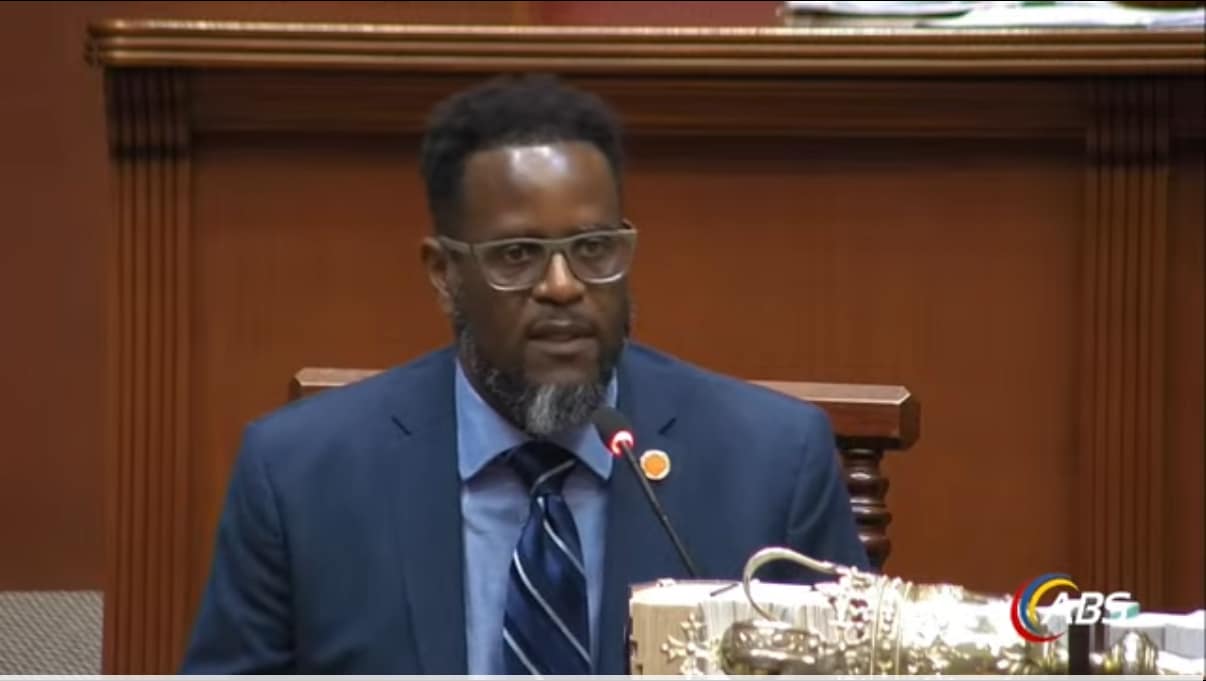Grenada’s position on the International Maritime Organisation (IMO) Net Zero Framework (NZF) remains undisclosed as voting approaches during the Marine Environment Protection Committee (MEPC) meetings in London from 14 to 17 October. The NZF aims to reduce greenhouse gas (GHG) emissions from ships, aligning with the IMO’s GHG Strategy. However, the framework faces significant opposition from the United States, which has threatened sanctions against supporting nations. In a joint statement on 10 October 2025, US Secretary of State Marco Rubio and Transportation Secretary Sean Duffy warned that countries endorsing the IMO’s decarbonisation plan could face port bans, visa restrictions on seafarers, punitive vessel fees, and sanctions on government officials. The Trump administration labeled the NZF as a “European-led neocolonial export of global climate regulations” and criticized it as a potential “global carbon tax.” Despite broad support from European nations, Pacific island states, and major liner groups, the US opposition could influence the MEPC vote. Grenada, as a small island state vulnerable to climate change impacts such as sea-level rise and biodiversity loss, faces a complex decision. The EU views the NZF as a critical milestone in maritime environmental protection, while the US stance highlights the geopolitical tensions surrounding global climate policies.
博客
-
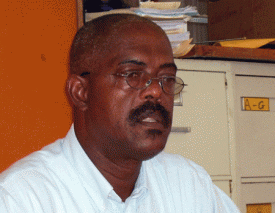
Parliament should discuss US radar request to install radar at MBIA
The Government of Grenada is currently evaluating a request from the United States to install radar equipment at Maurice Bishop International Airport (MBIA). The proposal, submitted by the Trump administration, has sparked a national debate, with former Upper House President Chester Humphrey urging parliamentary involvement in the decision-making process. Humphrey, a seasoned political figure with over two decades of service in the Labour Movement, emphasized the importance of legislative oversight, stating, ‘Parliament needs to meet on this matter before any commitments are made to the Americans.’ The Ministry of Foreign Affairs confirmed the request, noting that technical consultations with the Grenada Airports Authority (GAA) and other agencies are underway. The government assured citizens that public safety and the protection of the tourism industry would guide any decisions. Humphrey also cautioned against politicizing the issue, urging bipartisan support for the government. The outcome of this deliberation could have significant implications for Grenada’s international relations and domestic security.
-

Housing minister: Over half of homes promised have been delivered to Dominicans
In a significant stride toward climate resilience, the Government of Dominica has surpassed the halfway mark in its ambitious initiative to deliver 5,000 hurricane-resilient homes to its citizens. Minister of Housing and Urban Development, Melissa Poponne-Skerrit, announced this milestone during her recent appearance on DBS Radio’s ‘Focus on Government and Development.’ She emphasized that this housing initiative is a pivotal intervention in lifting citizens out of poverty, restoring pride, and providing hope and security in the aftermath of Hurricane Maria’s devastation. Currently, over 28,000 Dominicans are residing in these safer, more durable homes, marking a tangible step toward the nation’s goal of becoming the world’s first climate-resilient country. The government’s efforts are particularly concentrated in the Grand Bay area, where a modern, resilient village is under construction. This project includes 91 homes, 26 commercial spaces, a community center, a church, new roads, and infrastructure. Additionally, residential lots and facilities for the magistrate’s court and fire station are being developed. Beyond Grand Bay, similar projects are nearing completion in areas like Vieille Case, Penville, and Pointe Michel, with all expected to be finalized by year-end. The Housing Recovery Program has also made significant strides in the Kalinago Territory, where over a quarter of the total homes were constructed. Notably, the government intervened to resolve land ownership issues for over 170 applicants, ensuring their eligibility for the program. While the Housing Recovery Program officially concluded this year, the Ministry of Housing continues to hand over homes, bringing comfort and security to more Dominican families.
-
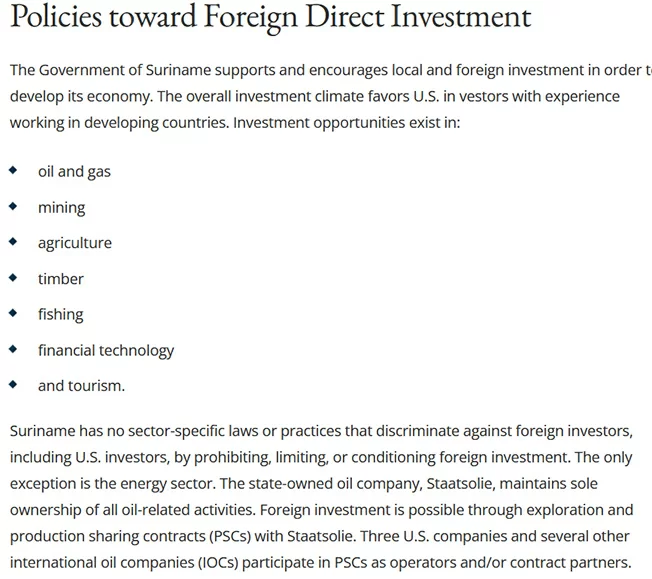
VS: Surinaams investeringsklimaat verbetert; hervormingen en olieproject stuwen vertrouwen
Suriname has witnessed a significant enhancement in its investment climate over the past year, driven by economic reforms, rising investor confidence, and growing foreign interest, particularly in the energy sector. This is highlighted in the 2025 Investment Climate Statements: Suriname, published by the U.S. Department of State. The report underscores a breakthrough in offshore oil development, with TotalEnergies and APA Corporation spearheading a USD 10.5 billion project set to commence production by 2028. Other major oil companies, including Chevron, Petronas, Shell, and PetroChina, are also active in Suriname’s concessions. In the gold mining sector, Newmont and Zijin dominate as the largest legal operators, with taxes from the regulated gold industry contributing approximately 80% of state revenues. The successful completion of the IMF’s Extended Fund Facility (EFF) program in March 2025 has stabilized the macroeconomy, with economic growth hovering around 3% and inflation dropping below 10% from a peak of 60% in 2021. The government has also restructured external debt through agreements with the Paris Club and China. Key reforms include the independence of the central bank, modernization of the currency framework, and the introduction of VAT in 2023. Additionally, a new procurement law, accounting act, and sovereign wealth fund act were enacted to enhance transparency. However, challenges persist, including opaque approval processes for foreign direct investment, corruption risks, stringent labor protections, and a high corporate tax rate of 36%. The report emphasizes that sustained institutional reforms, macroeconomic stability, and infrastructure investments are crucial to maintaining investor interest.
-
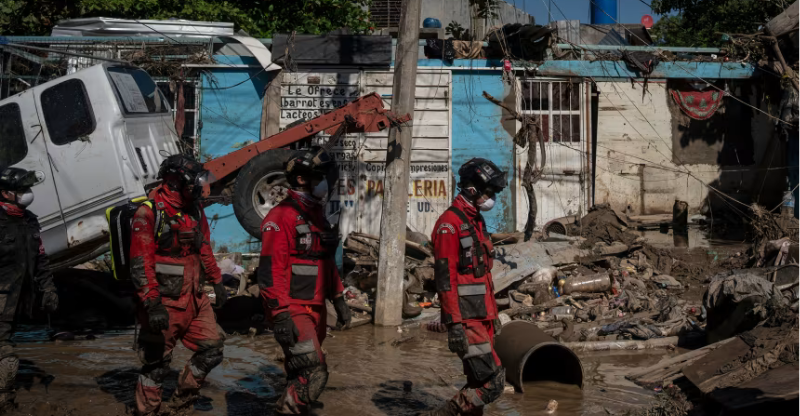
Catastrophic flooding claims 64 lives in Mexico
The catastrophic aftermath of last week’s torrential rains in central and southeastern Mexico has deepened, with the death toll climbing to 64 and 65 individuals still unaccounted for, as reported by Civil Defense Coordinator Laura Velázquez Alzúa. The relentless downpour triggered severe flooding and landslides, wreaking havoc across five states and leaving communities in ruins. President Claudia Sheinbaum has pledged to deploy “sufficient resources” without delay, emphasizing the nation’s ongoing state of emergency. The scale of destruction is staggering, with preliminary estimates indicating that over 100,000 homes have been affected. In riverside areas, entire dwellings have “practically vanished,” according to the President. In Poza Rica, an oil town located 170 miles northeast of Mexico City, residents were overwhelmed by the sudden surge of floodwaters. The Cazones River overflowed, unleashing over 12 feet (4 meters) of water into low-lying neighborhoods before dawn on October 10. Witnesses described hearing a terrifying “wall of water” before seeing it, accompanied by the deafening sounds of vehicles colliding as they were swept away. While some residents sensed the impending danger hours earlier and managed to flee with minimal belongings, the absence of an official warning system exacerbated the tragedy.
-
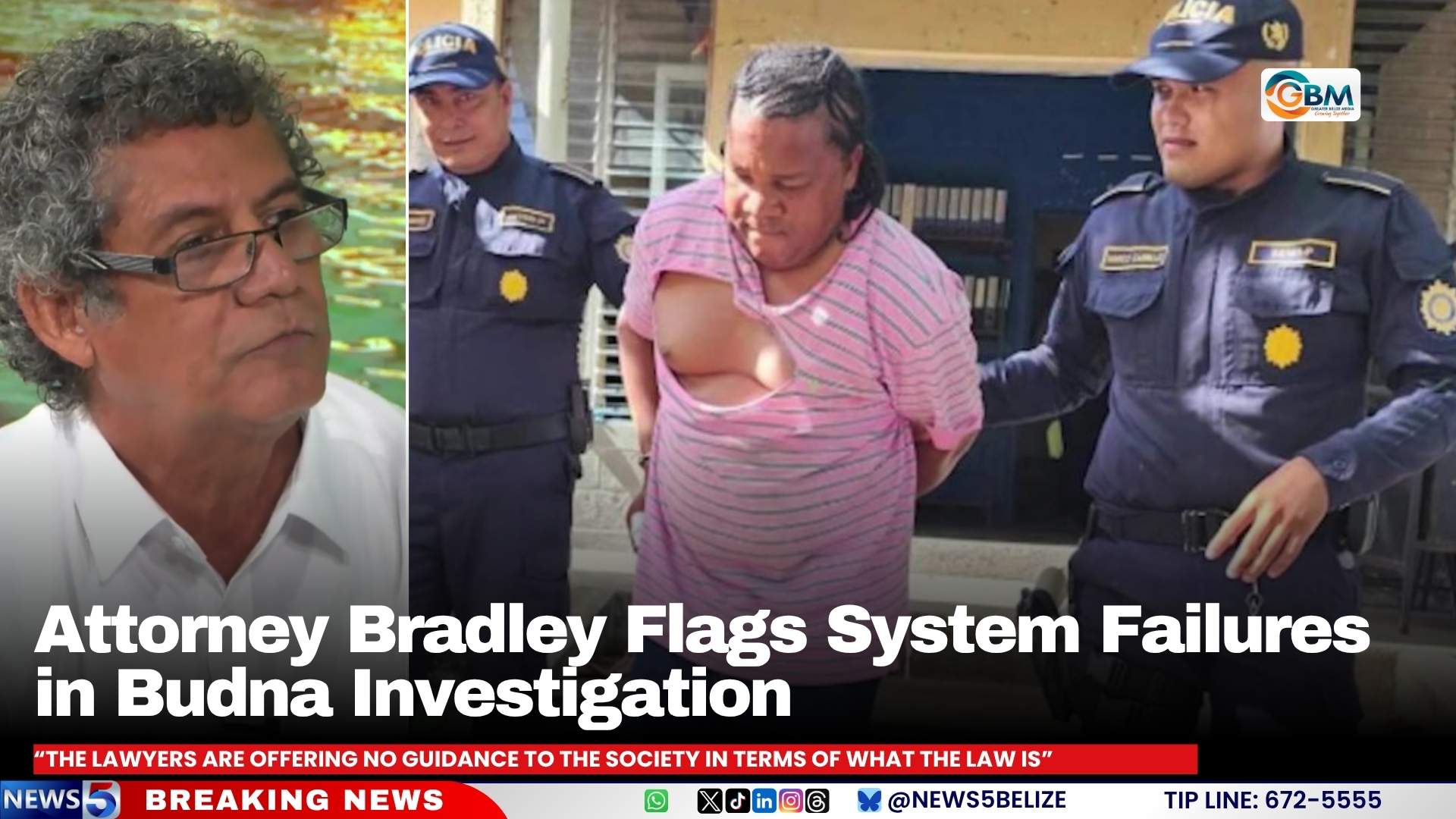
Attorney Bradley Flags System Failures in Budna Investigation
Attorney Richard “Dickie” Bradley has voiced significant concerns regarding the ongoing investigation into the abduction of Joseph Budna, emphasizing systemic failures and the need for transparency. Speaking on the program *Open Your Eyes*, Bradley highlighted the complexities of the case, particularly the involvement of police officers as suspects. He argued that an independent investigation cannot be conducted by the police themselves, given their potential complicity in the crime.
Budna was kidnapped in August, allegedly beaten, and subsequently handed over to Guatemalan authorities, with accusations of police involvement. The investigation has stalled for weeks, with recent recommendations calling for an independent probe. Bradley suggested that such an investigation should include retired judges or international agencies to ensure impartiality and prevent any attempts at influence or cover-ups.
Bradley also pointed to broader systemic issues, including the lack of whistleblower protections and insufficient guidance from the Bar Association. He stressed that individuals with evidence would be reluctant to come forward without legal safeguards. “We don’t have a whistleblower law, even in the face of something like this,” he remarked. He further criticized the legal community, stating, “The lawyers are no help. The Bar Association is stitched up.”
Regarding potential criminal accountability, Bradley noted that kidnapping under the country’s criminal code carries a minimum sentence of 10 years and could result in life imprisonment. However, details of the independent investigation remain unclear, leaving many questions unanswered.
-
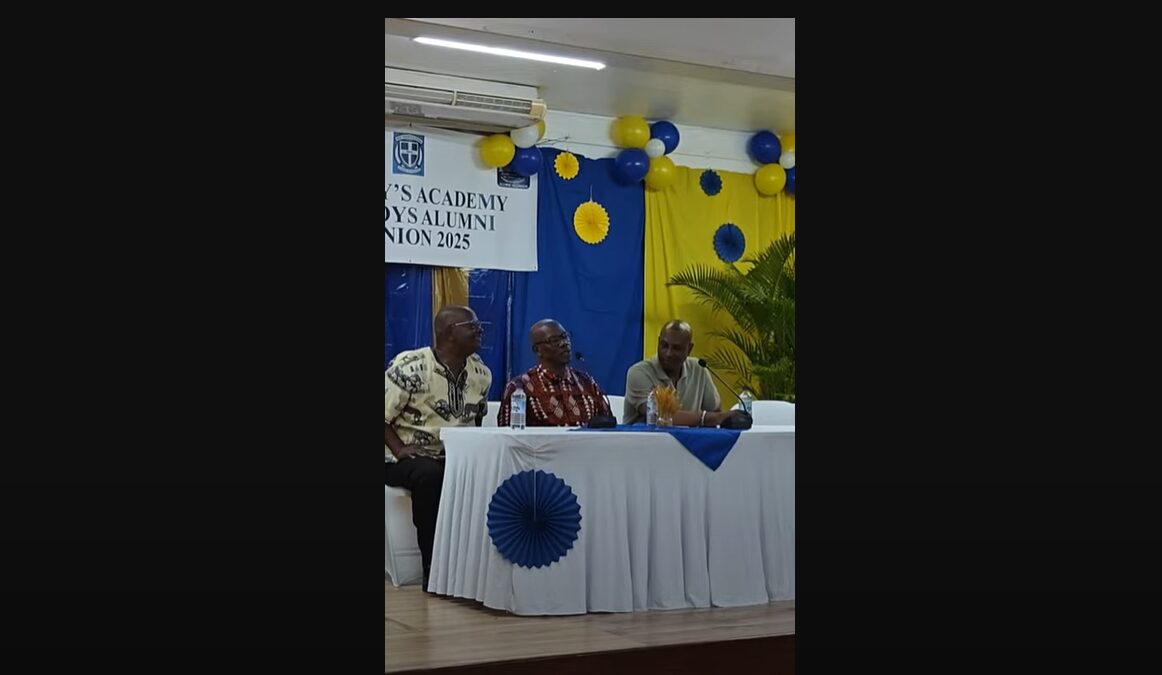
SMA Alumni Reunion 2025 – Evening of Reflections and Recollections
In the ever-evolving digital landscape, social media engagement tools such as ‘Share,’ ‘Tweet,’ ‘Pin,’ and similar features have become increasingly popular among users. These tools, designed to facilitate seamless content sharing across various platforms, are now integral to the way individuals interact online. The rise of these features can be attributed to their ability to enhance user experience by simplifying the process of disseminating information, fostering connections, and amplifying reach. As social media continues to dominate the digital sphere, these engagement tools are expected to evolve further, offering more sophisticated functionalities to meet the growing demands of users. Their widespread adoption underscores the importance of user-friendly interfaces in driving online engagement and connectivity.
-

Dominica Bar Association statement leverages constructive criticism of night court implementation
The Dominica Bar Association has raised significant concerns regarding the recent initiative by the Ministry of Legal Affairs to extend court hours at the Magistrates’ Court. The new schedule, which introduces evening sittings from 2:00 PM to 9:00 PM starting September 8, 2025, aims to improve access to justice and reduce case backlogs. While the Association acknowledges these objectives as commendable, it has highlighted several potential challenges that could undermine the initiative’s effectiveness.


